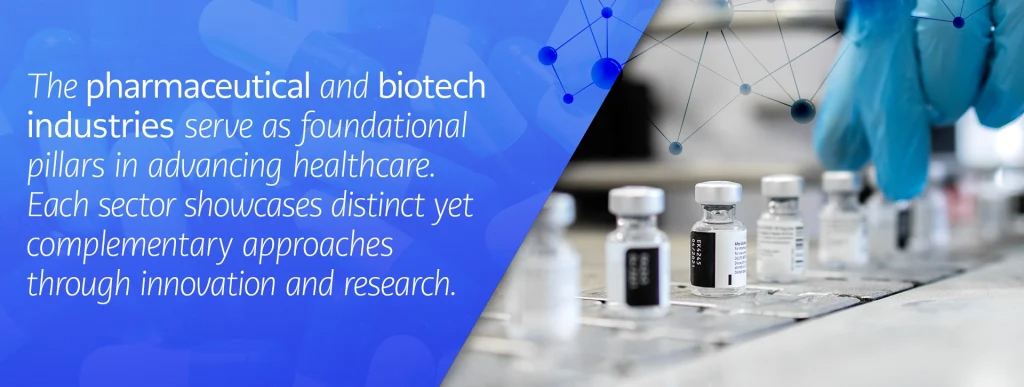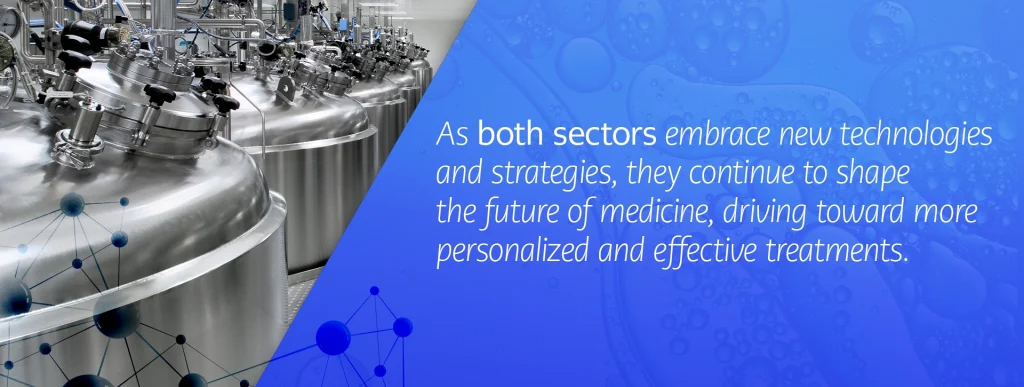
JUN 17, 2024 / BY WAYNE PEREANU, PHD / ART BY JESS HUDDY
Reading Time: 7 minutes
This blog will examine the pharmaceutical and biotechnology industries at a high level, including their historical evolution, current trends, and future directions. Through this exploration, we’ll review the unique contributions and interplay between these two critical industries.
The pharmaceutical and biotech industries serve as foundational pillars in advancing healthcare. Each sector showcases distinct yet complementary approaches through innovation and research.
The pharmaceutical industry develops, produces, and markets medications, including small-molecule drugs. It is characterized by its larger scale, established products, and strong regulatory focus. With multinational corporations dominating the market, the sector navigates complex approval processes to ensure the safety and effectiveness of its products. Additionally, it is increasingly exploring innovative drug delivery systems and collaborating with biotech firms to expand its research and development capabilities.
The biotech industry utilizes living organisms or their components to develop biotech products, often focusing on biologics, which are large molecule drugs derived from living cells. This sector is innovation-driven and research-intensive, with a strong focus on developing novel therapies for a wide range of diseases. Unlike the pharmaceutical industry, which primarily deals with small molecule drugs, the biotech industry is at the forefront of cutting-edge research, exploring areas such as gene therapy, personalized medicine, and regenerative medicine. The key characteristics of the biotech industry include its emphasis on breakthrough technologies, its reliance on scientific advancements to drive product development, and its commitment to addressing unmet medical needs through the creation of innovative biologic treatments.
While both the pharmaceutical and biotech industries share the common ground of aiming to improve health outcomes, they differ significantly in their approach to drug development, scale, and focus areas. The pharmaceutical industry is known for its large-scale operations and established products, primarily focusing on small-molecule drugs, which are chemically synthesized. In contrast, the biotech industry is more research-intensive and innovation-driven, concentrating on developing biologics, which are large molecule drugs derived from living organisms. This fundamental distinction in small molecule vs biologics underscores the industry’s different scientific and technological approaches. Additionally, the scale of operations and the focus on either established or novel therapies further highlight the differences between the two sectors.
Tracing the historical evolution of the pharmaceutical and biotech industries reveals pivotal moments and technological breakthroughs that have shaped their trajectories. These developments have redefined the healthcare landscape and highlighted the growing interconnections between these two sectors.
The pharmaceutical industry’s history is marked by key developments like the discovery of penicillin and the mass production of vaccines, highlighting its crucial role in healthcare. The introduction of patent laws and regulatory changes, such as stringent approval processes by agencies like the FDA, further shaped the industry. These milestones have driven the industry’s evolution, focusing on developing small-molecule drugs and advancing healthcare.
The biotech industry originated with breakthroughs like recombinant DNA technology and monoclonal antibodies, revolutionizing drug development. These foundational technologies allowed scientists to manipulate genetic material and harness the body’s immune system in unprecedented ways, paving the path for more targeted and effective therapies. Key milestones include the Human Genome Project and the rise of personalized medicine, which have shifted the focus toward individualized treatments. The mapping of the human genome opened vast opportunities to understand the genetic bases of diseases, leading directly to tailored therapies optimized for an individual’s genetic makeup. This evolution underscores the biotech industry’s commitment to advancing healthcare through innovative research and development.
The historical paths of the pharmaceutical and biotech industries have increasingly intersected due to collaboration and mergers, blurring the lines between the two sectors. Partnerships between pharma and biotech firms have become common, leveraging the strengths of each to accelerate drug discovery and development. Additionally, technological advancements, particularly in fields like genomics, proteomics, and bioinformatics, have profoundly impacted both industries. These innovations have enabled more precise targeting of diseases, leading to the development of more effective and personalized treatments. As a result, the distinction between pharma and biotech has become less clear, with both industries converging towards a shared goal of advancing healthcare through innovation.
Navigating the unique challenges the pharmaceutical and biotech industries face is essential for their continued growth and contribution to healthcare. While each sector encounters distinct obstacles, their ability to innovate and strategize is crucial in overcoming these hurdles and advancing medical science.
The pharmaceutical industry faces several unique challenges that impact its operations and growth. Navigating complex approval processes for pharmaceutical development is a significant regulatory hurdle. Companies must adhere to stringent guidelines set by regulatory agencies, such as the FDA, to ensure the safety and efficacy of their drugs, which can be time-consuming and costly. Another challenge is managing patent cliffs, where the loss of exclusivity on blockbuster drugs leads to a sharp decline in revenue as generic competitors enter the market. Additionally, market access presents a dilemma for the industry, as companies must balance the affordability of their drugs to ensure broad access while maintaining profitability to fund future research and development. These challenges require careful strategizing and innovation to sustain the industry’s contribution to healthcare.
The biotech industry faces unique challenges that differentiate it from the pharmaceutical sector. One of the primary hurdles is securing funding and investment for research-intensive biotech development. Biotech firms often rely on venture capital, grants, and partnerships to finance their innovative but costly research projects. Uncertainty and risk are inherent in the industry, with high failure rates in drug development due to the complex nature of biological systems and the stringent regulatory requirements for approval. Additionally, scaling up from research to commercial production poses significant challenges for biotech companies. Transitioning from small-scale laboratory experiments to large-scale manufacturing requires substantial financial investment, technical expertise, and strategic planning to ensure the successful commercialization of biotech products. These challenges underscore the dynamic and risk-intensive environment of the biotech industry.

The current trends and market dynamics within the pharmaceutical and biotech industries reflect their ongoing evolution and adaptation to a rapidly changing healthcare landscape. As both sectors embrace new technologies and strategies, they continue to shape the future of medicine, driving toward more personalized and effective treatments.
The pharmaceutical industry is experiencing several key trends and shifts in market dynamics. One significant trend is the shift towards specialty medicines, with a growing focus on rare diseases and precision medicine. This reflects a move from traditional blockbuster drugs to more targeted therapies catering to specific patient populations. Additionally, globalization is a prominent theme, as pharmaceutical companies are increasingly expanding into emerging markets to tap into new growth opportunities and diversify their revenue streams. Digital transformation is also reshaping the industry, with companies leveraging data analytics and artificial intelligence (AI) to streamline drug development, optimize supply chains, and enhance patient engagement. These trends reflect the industry’s adaptation to changing healthcare needs and technological advancements, positioning it for continued growth and innovation.
The biotech industry is witnessing several transformative trends and shifts in market dynamics. The rise of gene therapies is a standout trend, propelled by advances in CRISPR and other gene-editing technologies. These innovations are opening new avenues for treating genetic disorders, offering the potential for long-lasting and even curative treatments. Additionally, the industry is increasingly characterized by collaborative ecosystems, with biotech firms forming partnerships with academia, pharmaceutical companies, and tech companies. These collaborations are essential for pooling resources, sharing expertise, and accelerating the development of breakthrough therapies. Personalized medicine is another significant trend, with biotech companies focusing on tailoring treatments to individual genetic profiles. This approach promises more effective and targeted therapies, aligning with the broader shift towards precision medicine in healthcare. These trends underscore the biotech industry’s pivotal role in driving innovation and addressing unmet medical needs.

The pharmaceutical and biotech industries continuously push the boundaries of science and technology, leading to innovative advances and setting the stage for future breakthroughs. As both sectors harness cutting-edge technologies and explore new frontiers in medicine, they are reshaping the healthcare landscape and offering new hope for patients worldwide.
The pharmaceutical industry is at the forefront of several cutting-edge advances and is poised for future innovations. Next-generation biologics, such as antibody-drug conjugates and bispecific antibodies, are revolutionizing cancer therapy by enabling more precise targeting of tumor cells while sparing healthy tissue. Nanotechnology is another area of significant advancement, enhancing drug delivery and targeting at the molecular level, leading to improved efficacy and reduced side effects. Additionally, health technology integration is becoming increasingly prevalent, using wearables and digital therapeutics to monitor patient health, manage chronic conditions, and deliver personalized treatment regimens. These advancements reflect the pharmaceutical industry’s commitment to leveraging technology and innovation to improve patient outcomes and transform healthcare.
The biotech industry is at the cutting edge of several groundbreaking advances and is poised for future innovations. Cell and gene therapies, such as CAR-T cell therapy and gene replacement, are transforming the treatment landscape for various diseases, offering new hope for patients with previously untreatable conditions. Synthetic biology is another area of significant advancement, with biotech firms engineering organisms for specific purposes, including producing biofuels, pharmaceuticals, and sustainable materials. Precision microbiome engineering is gaining traction as a novel approach to modulating the microbiome for health benefits. By understanding and manipulating the complex interactions between the human body and its microbial inhabitants, biotech companies are exploring new ways to prevent and treat a range of diseases. These advancements underscore the biotech industry’s commitment to pushing the boundaries of science and technology to improve human health.
The interplay between biotech and pharma is a testament to the synergistic relationship that drives progress in healthcare. Both sectors contribute uniquely to medical advancements, with pharma providing established drug development frameworks and biotech pushing the boundaries of scientific innovation. As we look to the future, the evolving landscape of pharma vs biotech promises exciting innovations, with both industries continuing to play pivotal roles in shaping the future of healthcare and improving patient outcomes.
To learn about how Cobalt helps companies in both the pharma and biotech industries with all aspects of communications, visit the Cobalt services page or contact the Cobalt team to get started.
The original version of this page was published at: https://cobaltcommunications.com/cobalt-60/understanding-pharma-vs-biotech/
Cobalt works at the intersection of science and strategy, helping healthcare, medical, technology and scientific companies communicate more effectively with their internal and external audiences.
Whether you use slide shows to support your sales pitches, make presentations at industry events, or lead quarterly business review meetings with your team, they are one of the most ...read more
Color, with many other big and small design decisions, can attract and influence potential customers every time they see your logo, view your website, or scroll through social media. ...read more
Spoiler alert: The topic of this blog post is PowerPoint (or Keynote or Google Slides or any other presentation creation software). If you’re a “Death to PowerPoint” ...read more
As a marketer, you already know about the importance of understanding your customers and building relationships with them via compelling content. Your website, of course, is a primary ...read more